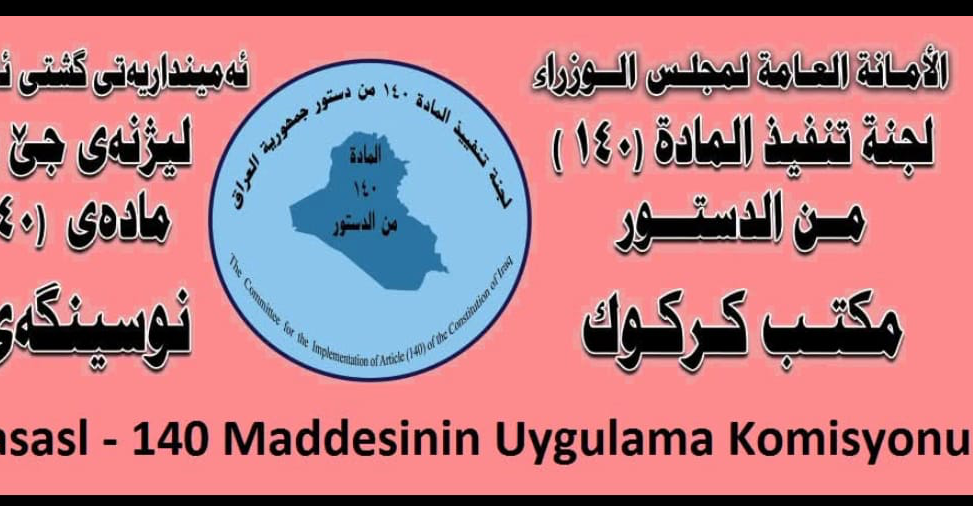Article 140 Committee: Agreements to resolve the issue of agricultural lands in Kirkuk
 Babakir Siddiq, announced on Wednesday that agreements had been reached to resolve the problem of agricultural lands between Kurdish and Arab farmers in the province.
Babakir Siddiq, announced on Wednesday that agreements had been reached to resolve the problem of agricultural lands between Kurdish and Arab farmers in the province.
A friend told Shafaq News Agency, “Kirkuk Governor Ribwar Taha Fateh headed the Article 140 Committee to find solutions, especially after the disputes that took place in the Balkana Sarkaran areas in the Dibis district between the Kurds and Arabs over agricultural lands.”
He added, “The Article Committee sent a committee to Kirkuk and held a meeting with the Director of Agriculture in Kirkuk and Kurdish and Arab farmers. A number of decisions were reached that will contribute to finding solutions for agricultural lands between Kurdish and Arab farmers. We will hold a meeting next Sunday with the head of the Article 140 Committee for the purpose of reaching decisions to resolve this problem, which contributes to the cultivation of the lands.”
He added, “Some decisions of the dissolved Revolutionary Command Council require a decision from the Iraqi Parliament in order to cancel them and restore rights to their owners through legal methods and formulas that satisfy all parties.”
Kirkuk Governor Ribwar Taha announced on Tuesday, November 12, that there are about 14 judicial decisions on agricultural areas of about 1,500 dunams, while there are no problems on about 18,000 dunams owned by Kurdish farmers.
Taha said in an interview with a number of media outlets, including Shafaq News Agency, that “the governorate administration held meetings with the Joint Operations Command and the commander of the 8th Division to address the problems of four agricultural districts in the district of Dibis (60 km northwest of Kirkuk), namely Bakana, Sarbshakh, Karbalak and Shinaga,” explaining that “after discussions with farmers from both the Kurdish and Arab components, it became clear that there are 14 judicial decisions regarding 1,500 dunams, and everyone agreed to keep them pending until their issue is resolved.” He added that “there are areas estimated at about 18,000 dunams that do not have any judicial problems or decisions preventing farmers from cultivating them, and their owners can cultivate them freely.”
He pointed out that the Department of Agriculture in Kirkuk was contacted to identify the districts that have judicial decisions, with the aim of protecting these lands until their fate is decided, as well as identifying the lands that do not have disputes to encourage farmers to work in them.
For his part, Deputy Speaker of Parliament Shakhwan Abdullah revealed that everyone is working to return agricultural lands to their rightful owners, and all political blocs agree to pass the law that restores the rights of the Kurds and Turkmen.
Kirkuk Agriculture Director Zuhair Ali told Shafak News Agency that 300,000 dunums of agricultural land are still outside the agricultural plan in the governorate.
He added that these lands include the areas of Hanjir and Shawan, parts of Yaiji, Dibs and Daquq districts, explaining that farmers can file complaints through documents with the courts of first instance.
He pointed out that the Federal Supreme Court confirmed in 2019 the continued validity of Article 140 of the Iraqi Constitution, which aims to cancel the demographic change policies imposed by Saddam Hussein’s regime, and implement statistical procedures and a referendum on the annexation of the disputed areas to the Kurdistan Region.
Article 140 stipulates the cancellation of the demographic change policies pursued by Saddam Hussein’s regime in the disputed areas in favor of the Arabs at the expense of the Kurds, and then a census of the population before the final step, which is to hold a referendum in which the population determines whether they wish to join the Kurdistan Region or remain under the administration of Baghdad.
The implementation stages of the article were scheduled to be completed by the end of 2007, but security and political problems prevented this.
In 2019, the Federal Supreme Court ruled that Article 140 of the Constitution of the Republic of Iraq would remain in effect, stressing that this would continue until its requirements were implemented and the goal of its legislation was achieved.
Shafaq.com
